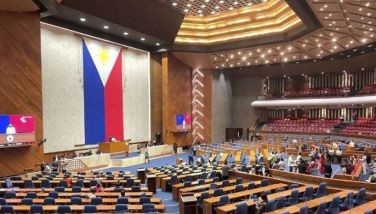Pilots’ group, PAL alarmed by ‘exodus’
March 19, 2006 | 12:00am
The Airline Pilots Association of the Philippines (ALPAP) and Philippine Airlines (PAL) expressed alarm yesterday over the increasing number of Filipino pilots and aircraft mechanics leaving for work with foreign airlines that offer higher salaries and better benefits.
Of the 74 pilots PAL lost from 2003 to 2004, nine resigned and retired in 2003 while 22 pilots ended their service in 2004.
ALPAP president Capt. Elmer Pena, PAL vice president for flight operations Capt. Johnny Andrews and PAL senior vice president for flight operations Capt. Rene Lim confirmed in a radio interview that the exodus of Filipino pilots and aircraft mechanics does pose a problem to the local airline industry.
"The trend is alarming because it is upward, although we still have normal operations in PAL," Andrews told the weekly radio program of Vice President Noli de Castro "Para Sa Iyo … Bayan."
Reports said at least 140 Filipino pilots and 2,000 aircraft mechanics are now working overseas.
From January to March this year, 28 pilots from PAL either resigned or retired, Andrews and Lim said.
PAL officials denied that the pilot shortage has caused flight delays but they admitted it could affect the airline’s expansion program.
But Lim added: "We are not in that situation yet."
Pena disclosed that Filipino pilots are enticed to work for foreign airline companies because they offer a monthly net salary ranging from $8,700 to $14,000.
Some of the airline companies offering higher compensation packages are Aseana, Eva Air and Singapore Airlines.
"The offer is bigger outside compared to what they are receiving here. Pataasan sila ng (They compete in the salaries they) offer because of the high demand for pilots," Pena said.
PAL pilot captains with international flights receive a gross monthly salary ranging from $4,000 to $7,000 while pilots for domestic flights receive P40,000 to P50,000 monthly.
PAL said it has been working on the salary increase of their pilots for the last two years. Pilots’ salaries have been increased by 40 percent, it added.
At present, PAL has 700 licensed pilots.
Meanwhile, the Philippine Overseas Employment Administration announced the POEA governing board has approved a new policy that will also apply to pilots who will now be required to notify employers six months prior to the date of their resignation.
The policy is aimed at preventing employees, including pilots, from becoming absent without official leave (AWOL) or filing for immediate resignation as has often been the case with overseas workers.
POEA Administrator Rosalinda Baldoz said the policy will take effect on March 30 after it was published in major newspapers last Friday.
Cesar Lambarte, PAL vice president for human resource development, said this new policy will ease the burden of finding qualified and experienced pilots as replacements.
Baldoz cited that Republic Act 8042, or the Migrant Workers Act, can ban the deployment of migrant workers "in pursuit of the national interest or when public welfare so requires."
"The President can do that," Baldoz said, but added such action can only be made after discussions and if a particular sector is affected by the shortage of workers here. — Pia Lee-Brago
Of the 74 pilots PAL lost from 2003 to 2004, nine resigned and retired in 2003 while 22 pilots ended their service in 2004.
ALPAP president Capt. Elmer Pena, PAL vice president for flight operations Capt. Johnny Andrews and PAL senior vice president for flight operations Capt. Rene Lim confirmed in a radio interview that the exodus of Filipino pilots and aircraft mechanics does pose a problem to the local airline industry.
"The trend is alarming because it is upward, although we still have normal operations in PAL," Andrews told the weekly radio program of Vice President Noli de Castro "Para Sa Iyo … Bayan."
Reports said at least 140 Filipino pilots and 2,000 aircraft mechanics are now working overseas.
From January to March this year, 28 pilots from PAL either resigned or retired, Andrews and Lim said.
PAL officials denied that the pilot shortage has caused flight delays but they admitted it could affect the airline’s expansion program.
But Lim added: "We are not in that situation yet."
Pena disclosed that Filipino pilots are enticed to work for foreign airline companies because they offer a monthly net salary ranging from $8,700 to $14,000.
Some of the airline companies offering higher compensation packages are Aseana, Eva Air and Singapore Airlines.
"The offer is bigger outside compared to what they are receiving here. Pataasan sila ng (They compete in the salaries they) offer because of the high demand for pilots," Pena said.
PAL pilot captains with international flights receive a gross monthly salary ranging from $4,000 to $7,000 while pilots for domestic flights receive P40,000 to P50,000 monthly.
PAL said it has been working on the salary increase of their pilots for the last two years. Pilots’ salaries have been increased by 40 percent, it added.
At present, PAL has 700 licensed pilots.
Meanwhile, the Philippine Overseas Employment Administration announced the POEA governing board has approved a new policy that will also apply to pilots who will now be required to notify employers six months prior to the date of their resignation.
The policy is aimed at preventing employees, including pilots, from becoming absent without official leave (AWOL) or filing for immediate resignation as has often been the case with overseas workers.
POEA Administrator Rosalinda Baldoz said the policy will take effect on March 30 after it was published in major newspapers last Friday.
Cesar Lambarte, PAL vice president for human resource development, said this new policy will ease the burden of finding qualified and experienced pilots as replacements.
Baldoz cited that Republic Act 8042, or the Migrant Workers Act, can ban the deployment of migrant workers "in pursuit of the national interest or when public welfare so requires."
"The President can do that," Baldoz said, but added such action can only be made after discussions and if a particular sector is affected by the shortage of workers here. — Pia Lee-Brago
BrandSpace Articles
<
>
- Latest
- Trending
Trending
Latest
Trending
Latest
Recommended

































